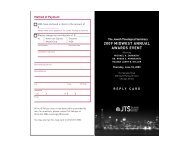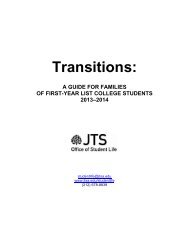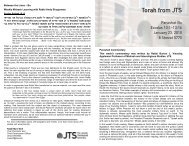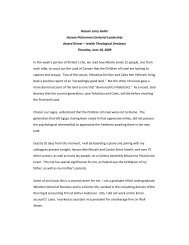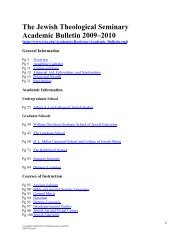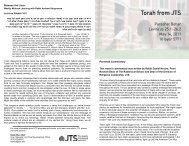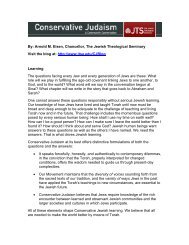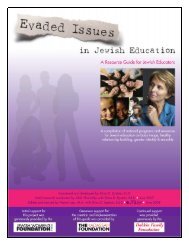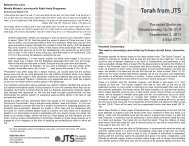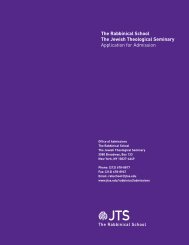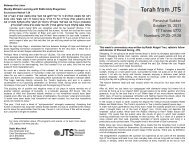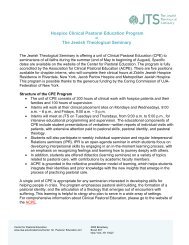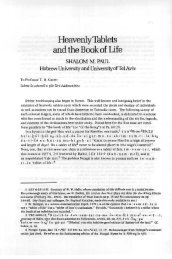Torah from JTS Nitzavim-Vayeilekh 5770
Torah from JTS Nitzavim-Vayeilekh 5770
Torah from JTS Nitzavim-Vayeilekh 5770
Create successful ePaper yourself
Turn your PDF publications into a flip-book with our unique Google optimized e-Paper software.
Between The Lines<br />
Weekly Midrash Learning with Rabbi Andy Shugerman<br />
(במדבר כז יח) ויאמר ה' אל מ ש ה ק ח ל ך א ת י ה ו ש ע ב ן נ ו ן ק ח ל ך ג ב ר ת ן כ מ ו ת ך. ק ח ל ך א י נ ו<br />
א ל א ב ל ק י ח ה ל פ י ש א י ן ח ב ר נ ק נ ה א ל א ב ק ש י ק ש י ן מ כ א ן א מ ר ו י ק נ ה א ד ם ח ב ר ל ע צ מ ו ש י ה א<br />
ק ו ר א ע מ ו ו ש ו נ ה ע מ ו א ו כ ל ע מ ו ו ש ו ת ה ע מ ו ו ג ו ל ה ל ו ס ת ר י ו ו כ ן ה ו א א ו מ ר (ק ה ל ת ד ט) ט ו ב י ם<br />
השנים מן האחד (שם קהלת ד יב) והחוט המשולש לא במהרה ינתק<br />
כ יון שמת משה היה יהושע בוכה ומצעק ומתאבל עליו במרד ו ה י ה א ו מ ר א ב י א ב י ר ב י ר ב י א ב י<br />
ש ג ד ל נ י ר ב י ש ל מ ד נ י ת ו ר ה ו ה י ה מ ת א ב ל ע ל י ו י מ י ם ר ב י ם ע ד ש א מ ר ל ו ה ק ד ו ש ב ר ו ך ה ו א<br />
ל י ה ו ש ע י ה ו ש ע ע ד כ מ ה א ת ה מ ת א ב ל ו ה ו ל ך ו כ י ל ך ב ל ב ד מ ת מ ש ה ו ה ל א ל א מ ת א ל א ל י<br />
ש מ י ו ם ש מ ת א ב ל ג ד ו ל ה ו א ל פ נ י ש נ א מ ר (י ש ע י ה כ ב י ב) ו י ק ר א ה' א ל ה י ם ב י ו ם ה ה ו א ל ב כ י<br />
ו למספד וגו' אלא מובט ח ל ו ש ב ן ה ע ו ל ם ה ב א ה ו א ש נ א מ ר (ד ב ר י ם ל א ט ז) ו י א מ ר ה' א ל מ ש ה<br />
הנך שכב עם אבותיך וקם<br />
And the Lord said to Moses: Take for yourself Joshua the son of Nun . . . (Num. 27:18):<br />
Take for yourself—a man as heroic as yourself. One can do this only by taking<br />
possession, for one cannot acquire a friend except by great effort, as the Sages have said:<br />
One should acquire a friend for himself, to study <strong>Torah</strong> with him, and to reveal his secrets<br />
to him, as it is said, Two are better than one . . . (Eccles. 4:9), and . . . a threefold cord is<br />
not quickly broken (Eccles. 4:12).<br />
Upon the death of Moses, Joshua wept, wailed, and mourned bitterly, saying, “My father,<br />
my father, my master, my master, my father who has raised me, my master who has<br />
taught me <strong>Torah</strong>!” He kept mourning over him for many days, until the Blessed Holy One<br />
said to him, “Joshua, how long will you continue mourning? Does his death affect you<br />
alone? Does not his death truly affect Me? For <strong>from</strong> the day he died there has been great<br />
mourning before Me, as it is said, And in that day did the Lord, the God of Hosts, call to<br />
weeping, and to lamentation, etc. (Isa. 22:12); but he is assured of the world to come, as it<br />
is said, And the Lord said to Moses: Behold, you are about to sleep with your ancestors<br />
and . . . will arise . . . (Deut. 31:16).”<br />
Almost one year has passed since my late friend and Rabbinical School classmate Rafi<br />
Lehmann (z”l) died. The bitterness I felt that day for our collective loss remains, as his<br />
cohort has since been ordained and we have begun our careers in the rabbinate without<br />
him.<br />
In preparing for Rafi’s first yahrzeit on the day after Yom Kippur, I take solace in lessons<br />
<strong>from</strong> the midrash above. The Sages imagine Joshua learning <strong>from</strong> Moses as “our Teacher”<br />
and with him as “a friend”; the younger leader’s cries to his “master” and “father”<br />
demonstrate the powerful and multifaceted relationship between the two men. Joshua’s<br />
bereavement eventually evokes an emotional response <strong>from</strong> God, whose rhetorical<br />
questions express both intense sadness and hope. While we can hardly fathom how the<br />
death of any individual affects God, this midrash assures us that our deceased heroes<br />
have departed <strong>from</strong> us only in a physical sense. Those who acquired Rafi as a friend<br />
expended great effort to match his example of love for <strong>Torah</strong>, dedication to community, and<br />
pious joy for life.<br />
Throughout the coming High Holy Days and beyond, let those of blessed memory inspire<br />
all of us to recommit ourselves to continued learning and acts of righteousness in their<br />
honor. May the merit of our efforts further establish their sacred legacy.<br />
For more information about <strong>JTS</strong> programs and events, or to learn more about<br />
<strong>JTS</strong>, please visit www.jtsa.edu.<br />
Rabbi Marc Wolf<br />
Vice Chancellor and Chief Development Officer<br />
(212) 678-8933<br />
mawolf@jtsa.edu<br />
<strong>Torah</strong> <strong>from</strong> <strong>JTS</strong><br />
Parashat <strong>Nitzavim</strong>-<strong>Vayeilekh</strong><br />
Deuteronomy 29:9–31:30<br />
September 4, 2010<br />
25 Elul <strong>5770</strong><br />
Parashah Commentary<br />
This week’s commentary was written by Rabbi Abigail Treu, rabbinic<br />
fellow and director of Donor Relations and Planned Giving, <strong>JTS</strong>.<br />
My kids have a hard time taking turns speaking. While their mother tries to instill<br />
some manners, they have taken to shouting, “Pause!” in order to silence one<br />
another, a phrase they’ve adapted <strong>from</strong> their use of the TV remote control to<br />
temporarily stop the scene unfolding on screen.<br />
An inviting metaphor: hitting pause on the forward motion of our lives, attending<br />
to what needs to be said or done, and then pressing the play button to continue<br />
the action. Of course, life doesn’t work that way. The High Holiday season<br />
invites us to try it, though: before the new year unfolds we pause, take time off<br />
<strong>from</strong> work to be with our fellow Jews, and stand still for a few days.<br />
Stand still, nitzavim, before we move forward, vayeilekh: the double parashah<br />
we read just before Rosh Hashanah invites us to recognize what we need to do.<br />
Stuck in the narrative while Moses talks—reviewing the history of forty years<br />
gone by and preparing for the future about to unfold—we hardly notice what the<br />
names of the parashah, <strong>Nitzavim</strong>-<strong>Vayeilekh</strong>, suggest.<br />
The metaphors of “pause” and “play” or of “stopping” and “starting,” however,<br />
do not do full justice to the rabbinic model. Yes, we are to stand still, to spend<br />
time reviewing and preparing before moving into a new year. But more than<br />
that, we must become a little disoriented, a little shaken up, in order to really be<br />
able to move forward in a meaningful way. If we simply hit pause, we haven’t<br />
done what our tradition is asking us to do this month. We need to go deeper,<br />
and for that we need to be taken out of the regular, ordered rhythm of life and<br />
into someplace at once familiar and disquieting.<br />
After reading straight through nearly four-fifths of the humash, we are almost at<br />
the end. The obvious way of concluding would be to hit pause, and then press<br />
play and read straight to the end. But that’s not what we do. For the next month,<br />
we are going to skip around. Here at <strong>Nitzavim</strong>-<strong>Vayeilekh</strong>, we are nearing the<br />
end of Moses’s last speech; but in a few days we will jump to the middle of<br />
Genesis for Rosh Hashanah. Not the beginning of Genesis, mind you, as the<br />
idea of a “new year” might suggest (in fact, for the birthday of the world it might<br />
make the most sense to read the Creation story). No: we read <strong>from</strong> the middle
of that first book of our national story. We don’t get too ensconced, however: for<br />
Yom Kippur, we land in Leviticus. A few days later, for Sukkot, we read <strong>from</strong><br />
Numbers, until Shabbat, at which point we are plunged into a mini-revelation scene<br />
<strong>from</strong> Exodus. Finally, on Simhat <strong>Torah</strong>, we pick up where we left off, back towards<br />
the end, finishing out Deuteronomy and then in one fell swoop beginning again “in<br />
the beginning.” Even the haftarot are jarring: after nine weeks straight of Isaiah, we<br />
will now be confronted with eleven different prophets in one month, eleven different<br />
voices and visions and understandings of what God wants <strong>from</strong> us. Until we finally<br />
land back with Joshua, with a narrative picking up where it left off, just as life will<br />
take its next steps as we settle again, “post-haggim,” into the rhythm of the normal.<br />
We are hitting pause and then being disoriented, through both the calendar and the<br />
text. We are in shul on Thursdays and Fridays, celebrating with friends and family<br />
on weeknights. In fact, this is part of why the Yamim Nora’im are so synagoguecentric:<br />
the place where so many Jews are so uncomfortable is precisely the place<br />
we are invited to come and take stock of our lives once a year. (For those of us<br />
who smugly feel at home at shul, we are handed a liturgy so different <strong>from</strong> the<br />
usual one that we, too, are stopped in our tracks.) And while we’re in shul, the very<br />
narratives that usually lend order and structure to our lives are presented out of<br />
order, disorienting us so that we are forced to step back and do the kind of deeper<br />
reflection that tradition calls on us to undertake.<br />
There is, however, one constant: the maftir readings. Over the course of the<br />
month, we slowly read Numbers 29 <strong>from</strong> start to finish, progressing in a<br />
chronologically sound manner through the list of festivals that we celebrate as we<br />
read. It is the one place tying together the chaos of the calendar and the narrative.<br />
The cycle of time, which we usually mark with the sidra, is for the month of Tishrei<br />
marked by the maftir. The coda reading, usually the afterthought, grounds us, and<br />
the juxtaposition of stories read out of order next to a maftir progressing on pace<br />
alerts us to the reality that the march of time is relentless, and we’d better stop and<br />
consider how we are living before it goes by too fast.<br />
Sometimes we need to stand still, nitzavim, and pause the action of our lives. And<br />
sometimes, too, we need to see things out of order, to read Genesis in the middle<br />
of Deuteronomy, Leviticus in the middle of Genesis, Numbers in the autumn. We<br />
need the narrative to jolt us into seeing things differently. After a year of slogging<br />
through the parashah, we have grown complacent to the truths it has revealed;<br />
reading it out of order makes it new again, just in time for us to go, vayeilekh, and<br />
face the newness available to us in the year ahead.<br />
This week, we will leave off mid-sentence. We stand, paused in the desert as the<br />
final verse of <strong>Vayeilekh</strong> brings us to the edge of motion: “Then Moses recited the<br />
words of this poem to the very end, in the hearing of the whole congregation of<br />
Israel.” What poem? What did he say? We have to wait a month to hear it. By then,<br />
the calendar will have moved us into a new year. We will have had Rosh<br />
Hashanah and Yom Kippur and Sukkot to review the journey we have taken thus<br />
far and to articulate our hopes and dreams for the year ahead. We stand still,<br />
narratively on pause but also traveling great distances, for in the intervening weeks<br />
of living with schedules and parshiyot upended, we hope to achieve an inner<br />
stillness that will steel us for a new year of purpose and forward direction.<br />
A Taste of <strong>Torah</strong><br />
A Commentary by Rabbi Matthew Berkowitz, director of Israel<br />
Programs, <strong>JTS</strong><br />
Deuteronomy 30:1–3 When all these things befall you . . . and you take<br />
them amidst the various nations to which the Lord your God has banished<br />
you, and you return to the Lord your God, and you and your children heed<br />
His command with all your heart and soul, just as I enjoin you this day, the<br />
Lord your God will restore your fortunes and take you back in love. God will<br />
return and collect you <strong>from</strong> among all the peoples that God has scattered<br />
you.<br />
B’khor Shor, “God will return and collect you <strong>from</strong> among all the peoples,”<br />
God will return us <strong>from</strong> the Babylonian exile and will collect us <strong>from</strong> the<br />
great and long exile in which we are scattered today. Our rabbis explain<br />
<strong>from</strong> this verse that God suffers in the trials of Israel as it is written, “in all of<br />
their sorrows, He is pained” (Isaiah 63:9). And when they return, it is as if<br />
God returns since it is written, “God will return” (Deut 30:3) and not “God will<br />
cause them to return.”<br />
Parashat <strong>Nitzavim</strong> continues Deuteronomy’s central message of loyalty to<br />
the covenant. The Israelites are commanded to observe the many laws that<br />
God has given to them. Promises of blessing were described extensively in<br />
last week’s parashah, as was the threat of punishment, in the form of<br />
curses. The theology of quid pro quo hangs in the balance as the Israelites<br />
are about to enter into the Promised Land. Still, with all the punishment that<br />
is threatened for wayward behavior, Parashat <strong>Nitzavim</strong> delivers a powerful<br />
message of hope and deliverance. When all of the blessings and curses<br />
have come to pass and Israel finds itself scattered all over the world, hope<br />
of return should not be abandoned. How can we translate and internalize<br />
our parashah’s promise?<br />
Commenting on Deuteronomy 30:3, the B’khor Shor explains the power of<br />
this verse. First, given the repetition of the word return, he explains that the<br />
first instance refers to a return <strong>from</strong> Babylonian exile, while the second<br />
alludes to a return <strong>from</strong> what he calls the “great and long exile.” He also<br />
explains that God and Israel are bound to one another. Quoting <strong>from</strong> a<br />
rabbinic midrash (Tractate Megillah 29a), he teaches that God literally<br />
suffers with Israel and, in the end, will return with Israel.<br />
Destiny is shared. As we approach Rosh Hashanah and focus on the<br />
theme of repentance, we can never lose sight that teshuvah is mutual. Far<br />
<strong>from</strong> being a one-way street, the process involves both human beings and<br />
God reaching out to each other. We have the capacity to bring God into our<br />
midst. Carpe diem. Truly, let us seize this season of repentance!<br />
The publication and distribution of A Taste of <strong>Torah</strong> are made possible by a generous grant<br />
<strong>from</strong> Sam and Marilee Susi.<br />
The publication and distribution of the <strong>JTS</strong> Commentary are made possible by a generous grant<br />
<strong>from</strong> Rita Dee and Harold (z”l) Hassenfeld.



